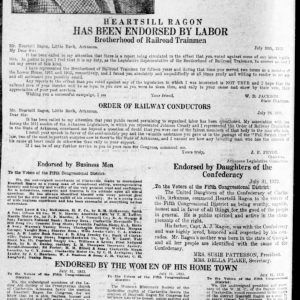calsfoundation@cals.org
Willie Blount Wright (W. B. W.) Heartsill (1840–1913)
During the 1880s and 1890s, Willie Blount Wright Heartsill (whose first name was pronounced “Wylie” and who was better known as W. B. W. Heartsill) played an active role in the farmer and labor movements in Arkansas. By the early 1890s, he had assumed a position of leadership in both movements, becoming the head of the Knights of Labor in the state and running for Congress as a Populist candidate in 1892. He later served in the Arkansas General Assembly.
W. B. W. Heartsill was born in Louisville, Tennessee, on September 14, 1840, to Hiram Heartsill and Amanda Wright Heartsill. He married three times and was the father of seven children. During the Civil War, Heartsill was in the Confederate army, serving at various times as a captain, a spy, and a scout for an independent company of Tennessee scouts called Osborne’s Scouts. He also held the position of chief of police of East Tennessee at one point during the war. After the war ended, Heartsill moved to Greenwood (Sebastian County), and he remained in Arkansas for the rest of his life. He bought a farm, held positions in the Sebastian County Circuit Court, and served as a postmaster from 1885 to 1889.
Heartsill’s involvement in the farmers’ movement began in 1884 when he joined the Brothers of Freedom, an organization formed in Johnson County in 1882 that consisted largely of yeomen or small landowning farmers. In 1885, the Brothers of Freedom merged into the Agricultural Wheel, a similar organization that had been founded in 1882 in Prairie County. In Sebastian County, this merger was complicated by internal quarreling, and, in 1887, Heartsill helped to organize an independent order of Farmers, Mechanics, and Workingmen, which soon entered the Farmers’ Alliance. Heartsill subsequently worked as an organizer for the Farmers’ Alliance in Arkansas in the early 1890s.
In 1892, as the Farmers’ Alliance began to decline, Heartsill became active in another (also waning) organization, the Knights of Labor. Heartsill joined the Knights’ Greenwood Local Assembly 239 in March 1892, just weeks after it was formed. While most members of Heartsill’s assembly were coal miners, his assembly and the ranks of Arkansas Knights in general included farmers as well, and the Knights had considerable ties with the farmers’ movement in Arkansas and elsewhere. Moreover, Heartsill’s role in the Farmers’ Alliance had won him the respect of Little Rock (Pulaski County) trade unionists, some of whom had unsuccessfully urged him to run for Congress in 1890.
In 1892, Heartsill accepted the nomination of the new People’s (or Populist) Party for the U.S. House of Representatives in the Second District. As the lone challenger to Democratic incumbent Clifton R. Breckinridge, Heartsill—whose campaign was hindered by both a lack of funds and the restrictive state Election Law of 1891—received only twenty-nine percent of the vote.
Nevertheless, nearly one year after that defeat, the Arkansas Knights of Labor chose Heartsill as their highest-ranking officer, State Master Workman. Holding that position for two years, Heartsill essentially presided over the Knights’ demise in Arkansas, and he spent much of his term trying to settle an ongoing dispute between a succession of coal mine operators and the Knights in Greenwood. In 1906, well after the disappearance of the Populist Party (as well as the Knights) in Arkansas, Heartsill won election as a Democratic state representative from Sebastian County. In this capacity, he remained an ally of organized labor, especially the United Mine Workers.
Heartsill was elected to the state legislature again in 1908 and 1912, but he did not live to serve his third term. He died in Little Rock on March 7, 1913. He is buried in Greenwood’s Liberty Cemetery.
For additional information:
Baskett, Thomas S., Jr. “Miners Stay Away!: W. B. W. Heartsill and the Last Years of the Arkansas Knights of Labor, 1892–1896.” Arkansas Historical Quarterly 42 (Summer 1983): 107–133.
Hild, Matthew. Greenbackers, Knights of Labor, and Populists: Farmer-Labor Insurgency in the Late-Nineteenth-Century South. Athens: University of Georgia Press, 2007.
———. “Labor, Third-Party Politics, and New South Democracy in Arkansas, 1884–1896.” Arkansas Historical Quarterly 63 (Spring 2004): 24–43.
W. B. W. Heartsill Papers, 1864–1945. Center for Arkansas History and Culture. University of Arkansas at Little Rock, Little Rock, Arkansas.
Wheeler, John M. “The People’s Party in Arkansas, 1891–1896.” PhD diss., Tulane University, 1975.
Matthew Hild
Georgia Institute of Technology
 Civil Rights and Social Change
Civil Rights and Social Change Politics and Government
Politics and Government Post-Reconstruction through the Gilded Age, 1875 through 1900
Post-Reconstruction through the Gilded Age, 1875 through 1900 Heartsill Campaign Ad
Heartsill Campaign Ad 



Comments
No comments on this entry yet.